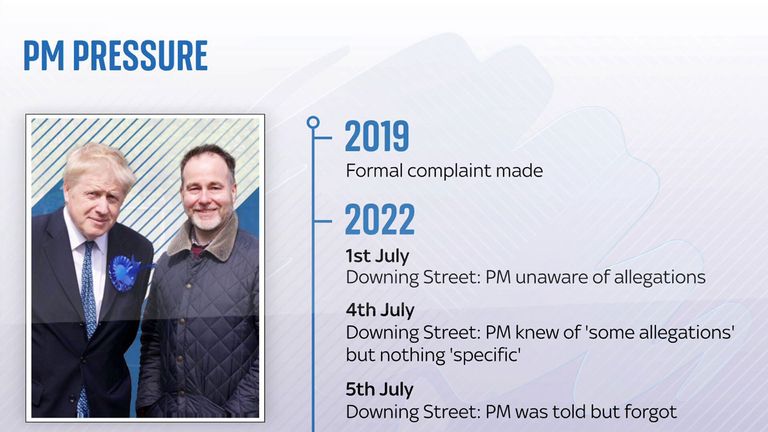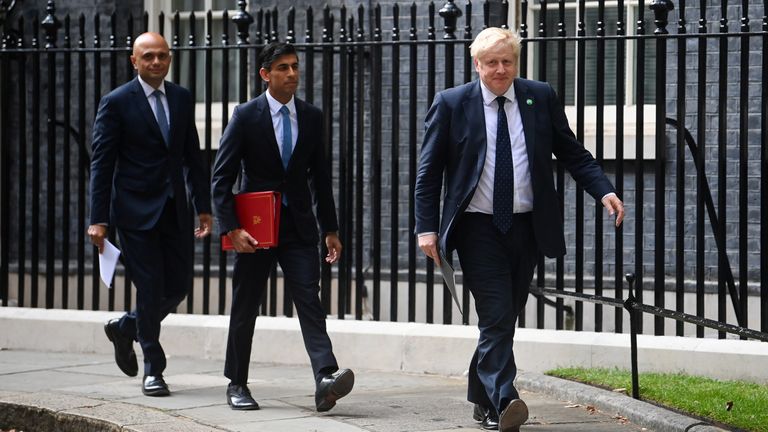Boris Johnson prepares for double probe at PMQs and Liaison Committee hearing after mini-cabinet reshuffle prompted by shock resignations
Liaison Committee #LiaisonCommittee

Boris Johnson can expect a torrid time today as he faces both Prime Minister’s Questions and the parliamentary Liaison Committee, less than 24 hours after Rishi Sunak and Sajid Javid dramatically resigned as members of his cabinet.
On Tuesday evening, Chancellor Mr Sunak and Health Secretary Mr Javid quit the government, leading to a wave of resignations.
A total of 10 Conservative MPs left their positions – two cabinet ministers, one minister, four parliamentary private secretaries, one vice chair and two trade envoys.
The resignations have left the prime minister battling to remain in office in the face of questions about his handling of the row over MP Chris Pincher’s conduct.
Politics Hub: Rishi Sunak and Sajid Javid quit – follow live reaction
Mr Pincher quit as deputy chief whip last week after claims that he groped two men at a private members’ club, but Mr Johnson had been told about concerns around his behaviour dating back several years.
In Mr Sunak’s resignation letter, published on Twitter, said that he could no longer remain loyal to the prime minister, who remains mired in scandal over the appointment of Mr Pincher.
The former chancellor, tipped as a potential future leader of the Conservative Party, told the prime minister he was quitting with “great sadness”, saying: “To leave ministerial office is a serious matter at any time. For me to step down as chancellor while the world is suffering the economic consequences of the pandemic, the war in Ukraine and other serious challenges is a decision that I have not taken lightly.
“However, the public rightly expect government to be conducted properly, competently and seriously. I recognise this may be my last ministerial job, but I believe these standards are worth fighting for and that is why I am resigning.”
In his resignation letter, Mr Javid – also a former chancellor, having quit Mr Johnson’s cabinet once before – said the British people “expect integrity from their government” but voters now believed the current administration was neither competent nor “acting in the national interest”.
Standing down as solicitor general, Alex Chalk said in his correspondence to the PM: “To be in government is to accept the duty to argue for difficult or even unpopular policy positions where that serves the broader national interest. But it cannot extend to defending the indefensible.”
Moments before the resignation letters began to emerge, the prime minister acknowledged he should have sacked Mr Pincher when he was found to have behaved inappropriately when he was a Foreign Office minister in 2019, but instead went on to appoint him to other government roles.
It had a few hours earlier been confirmed that the prime minister was previously told about an investigation into the disgraced MP’s inappropriate behaviour in 2019, despite days of Number 10 saying Mr Johnson was unaware of specific allegations against him.
But the apology from the PM for appointing Mr Pincher was unable to prevent the wave of departures.
1:25 Chris Pincher timeline
Zahawi promoted to chancellor
Meanwhile, Nadhim Zahawi was later in the evening appointed as chancellor following Mr Sunak’s departure.
He moves from the post of education secretary, a role which has now been awarded to former Universities minister Michelle Donelan.
Steve Barclay has been appointed to the role of health secretary, replacing Mr Javid.
He said it was “an honour” to take up the job.
Mr Barclay was previously the chancellor of the Duchy of Lancaster and chief of staff for Downing Street – a position that now remains vacant.
The PM will likely be pressed further on both his handling of the row regarding Mr Pincher and the subsequent senior cabinet resignations by Labour leader Sir Keir Starmer at midday during PMQs.
Responding to the departures on Tuesday evening, Sir Keir called for a general election, saying: “Only a real change of government can give Britain the fresh start it needs.”
Mr Johnson will later in the afternoon face questions from the powerful Liaison Committee in the wake of the latest scandal to come to light during his premiership.
The prime minister is set to be quizzed on a range of topics, including “integrity in politics”, the rule of law, and Ukraine and its impacts on the UK, the rising cost of living and the government’s response.
But both his appointment of former deputy chief whip Mr Pincher and partygate are both also likely to come up.
2:05 Should the Prime Minister resign?
PM’s position remains perilous
The twin resignations of Mr Javid and Mr Sunak mean Mr Johnson’s position remains perilous, but cabinet ministers including Dominic Raab, Liz Truss, Michael Gove, Therese Coffey and Ben Wallace did indicate they would be staying in the government and that they still support the prime minister.
However, seven in 10 Britons think Mr Johnson should resign, according to a snap YouGov poll of more than 3,000 people.
The PM has reportedly told allies that he is determined to fight on despite the resignations.
Asked by one aide if he would quit, he replied: “F*** that,” according to reports in The Times.
Read more: Who are the frontrunners for the PM’s job if his time is up?
The loss of crunch by-elections in Tiverton and Honiton and Wakefield in June triggered the resignation of party chairman Oliver Dowden last month.
The position of Conservative Party chairman remains unfilled, as does the role of vice-party chairman following the departure of Bim Afolami who resigned on live television on Tuesday evening.
My Johnson’s fate could ultimately lie with the Conservative 1922 Committee. Its rules say there cannot be another leadership confidence vote for 12 months after one has taken place. However, rules can be changed.
The PM narrowly survived a confidence vote last month, but suffered a rebellion bigger than that against Theresa May in 2019.
Some 211 MPs voted for Mr Johnson, compared to 148 votes against – a majority of 63.
He needed a simple majority – 180 votes or more – to continue in office.
The result meant 59% of Conservative MPs backed Mr Johnson, with 41% voting against him.
Watch PMQs live on Sky News, mobile and web from 12pm and the liaison committee from 3pm.
 1:25 Chris Pincher timeline
1:25 Chris Pincher timeline  2:05 Should the Prime Minister resign?
2:05 Should the Prime Minister resign?